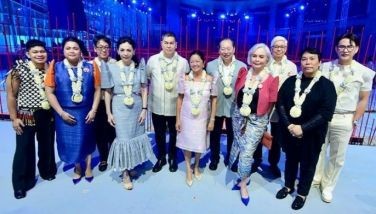Gov’t downsizing starts

August 13, 2004 | 12:00am
The government has started its downsizing program beginning with the Sugar Regulatory Administration, as President Arroyo issued Executive Order 339 pushing the early retirement of SRA employees.
The President signed EO 339 on July 29. A copy was obtained by The STAR yesterday.
Mrs. Arroyo invoked her powers under Sections 77 and 78 of the General Appropriations Act of 2003 (Republic Act 9206), "as re-enacted," as the authority to implement the "early retirement" program for the SRA.
The President said these provisions of RA 9206 empowered her "to direct changes in the organizational units or key positions of any department or agency, and to require all departments/agencies of the executive branch to conduct a comprehensive review of their respective mandates, missions, objectives, functions, programs, projects, activities and systems and procedures, identify areas for improvement and implement structural, functional and operational adjustments to improve government’s service delivery and productivity, respectively."
Since Malacañang has yet to resubmit an early retirement bill to Congress for approval, Mrs. Arroyo stated in EO 339 that retirement benefits at the SRA would be based on existing laws, which date back to the Commonwealth Acts.
The early retirement bill was first filed during the previous Congress but was not passed into law.
The President also cited a decision by the Supreme Court, dated Aug. 5, 1991, that ruled the SRA is "neither a government-owned or controlled corporation nor a subsidiary but an administrative agency."
The SRA, attached to the Department of Agriculture, is currently headed by James Christopher Ledesma.
The President said the SRA, created by RA 632 on June 6, 1951, is one of the agencies of government that "needs to pursue institutional reforms to address the inconsistencies and redundancies in its present setup considering the current situation of the situation of the sugar industry and the sustainability of its operations."
In her directive, Mrs. Arroyo ordered the SRA to submit its revised organizational structure and staffing pattern to the Department of Budget and Management (DBM) within 60 days from the signing of EO 339.
The President directed that the retirement and separation package for affected SRA personnel shall be made available not later than 120 days from the date EO 339 was signed. The SRA’s current corporate operating funds will be used to compensate affected personnel, and the national government will provide assistance if the agency’s funds are not enough.
In the same EO, Mrs. Arroyo prohibited the SRA from hiring additional personnel — whether on a permanent, temporary, contractual, casual or job order basis — and from renewing the contracts or appointments of all employees hired on a contractual, casual or temporary basis during the rationalization process.
The President also ordered that personnel who retire or are separated as a result of the SRA’s rationalization program shall not be rehired for the next five years in other national government agencies, including government-owned or controlled corporations and government financial institutions, except in educational institutions and hospitals.
Affected SRA personnel have the option to remain in government if they have a permanent or temporary appointment attested to by the Civil Service Commission. They may also opt to retire or be separated and paid retirement benefits.
Those who avail themselves of the latter option shall be paid a retirement gratuity under RA 1616 — which further amends Section 12 of Commonwealth Act 186 as amended, by prescribing two modes of retirement — payable by the SRA, as well as the refund of retirement premiums by the Government Service Insurance System (GSIS).
They will also be entitled to retirement benefits under RA 660 — which created the GSIS — or applicable retirement, separation or unemployment benefits under RA 8291, which increased the coverage and benefits of GSIS members.
Under RA 8291, government employees are given one-half of their monthly salary for every year of service for the first 20 years and a fraction thereof; three-fourths of their monthly salary for every additional year of service from the 21st to the 30th year of service and a fraction thereof; and one month’s salary for every additional year of service from the 31st year of tenure onwards.
In her state of the nation address last July 26, the President reminded lawmakers about her long-pending bill on "re-engineering the government," which seeks to lessen the number of government employees through an early retirement program.
There are currently 1.2 million personnel in various departments and agencies under the executive branch.
DBM Secretary Emilia Boncodin earlier said an initial amount of P15 billion was made available for the early retirement program, but there were few government employees who chose "voluntary" separation or retirement.
Boncodin admitted the difficulty in implementing the government’s "re-engineering" program, which she said was worked out as early as two years ago by the Presidential Committee on Effective Governance, headed by Executive Secretary Alberto Romulo.
Mrs. Arroyo has reassured government employees that an "attractive package" of benefits will be given to those who avail of the "early retirement" program, which was devised by her economic managers to streamline the bureaucracy.
The President cited the voluntary retirement program implemented in 2002 by the state-run National Power Corp., which was privatized in line with the Electric Power Industry Reform Act of 2001.
Meanwhile, the President recast the Presidential Commission on Values Formation (PCVF) into an "ad hoc" Council on Values Formation to attract religious leaders into joining the council.
She also designated the head of the Department of Education as her "co-chair" in the council since the DepEd supervises basic education in the country, including the inculcation of moral values in Filipinos.
Mrs. Arroyo disclosed this over a luncheon meeting with the officers of the newly organized Kapisanan ng mga Komentarista ng Pilipinas after she inducted them into office at the Palace yesterday, in the presence of Presidential Spokesman Ignacio Bunye and Press Secretary Milton Alingod.
The President "said she would convene the Council on Values Formation, which she will chair and co-chair will be DepEd," Bunye said.
He added that Mrs. Arroyo named Isabel Gonzales-Tobias, an active religious lay leader, as the council’s secretary-general. She is tasked with holding values formation seminars among government employees, starting with graft-prone agencies like the Bureau of Customs, the Bureau of Internal Revenue and the Department of Public Works and Highways.
Bunye told The STAR yesterday the President decided to further recast the PCVF into a mere "ad hoc body" through a council-type organizational structure because of the reluctance of the private sector, especially representatives of religious groups, to join what many perceive as a government entity.
Mrs. Arroyo created the PCVF with EO 314, which she signed on Apr. 30, 2004. It was originally conceived that this body will be led by a chairperson with the rank of presidential adviser and six members appointed by the President for a term co-terminus with her.
The President empowered the PCVF to serve as the lead agency by which the government may work hand-in-hand with civil society groups and the private sector in establishing a strong foundation for moral value formation, which is her long-term measure to fight graft and corruption in government.
Mrs. Arroyo subsequently amended EO 314 with EO 317, issued on June 8, 2004. She said the PCVF shall now be headed by the President as chairperson and 10 members.
Bunye explained that this new council-type body "provides more flexibility for religious leaders to participate," compared to a "commission," which is normally perceived to be a government body.
The President earlier expressed her intention to invite "high profile religious personalities" to join the council, including Manila Archbishop Gaudencio Rosales, Eraño Manalo of Iglesia ni Cristo, Bro. Mike Velarde of the El Shaddai Charismatic Movement, Bro. Eddie Villanueva of the Jesus is Lord Movement, Bishop Efraim Tendero of the Philippine Council of Evangelical Churches, and Bishop Apollo Quiboloy of the Jesus Miracle Crusade.
"The idea of the President is to be able to get them together (on an) ad hoc basis and the secretary-general would be the one to shepherd the values formation seminars in the various government agencies," Bunye said.
He also said the President may likely issue another EO to further amend specific provisions creating the council.
The President signed EO 339 on July 29. A copy was obtained by The STAR yesterday.
Mrs. Arroyo invoked her powers under Sections 77 and 78 of the General Appropriations Act of 2003 (Republic Act 9206), "as re-enacted," as the authority to implement the "early retirement" program for the SRA.
The President said these provisions of RA 9206 empowered her "to direct changes in the organizational units or key positions of any department or agency, and to require all departments/agencies of the executive branch to conduct a comprehensive review of their respective mandates, missions, objectives, functions, programs, projects, activities and systems and procedures, identify areas for improvement and implement structural, functional and operational adjustments to improve government’s service delivery and productivity, respectively."
Since Malacañang has yet to resubmit an early retirement bill to Congress for approval, Mrs. Arroyo stated in EO 339 that retirement benefits at the SRA would be based on existing laws, which date back to the Commonwealth Acts.
The early retirement bill was first filed during the previous Congress but was not passed into law.
The President also cited a decision by the Supreme Court, dated Aug. 5, 1991, that ruled the SRA is "neither a government-owned or controlled corporation nor a subsidiary but an administrative agency."
The SRA, attached to the Department of Agriculture, is currently headed by James Christopher Ledesma.
The President said the SRA, created by RA 632 on June 6, 1951, is one of the agencies of government that "needs to pursue institutional reforms to address the inconsistencies and redundancies in its present setup considering the current situation of the situation of the sugar industry and the sustainability of its operations."
In her directive, Mrs. Arroyo ordered the SRA to submit its revised organizational structure and staffing pattern to the Department of Budget and Management (DBM) within 60 days from the signing of EO 339.
The President directed that the retirement and separation package for affected SRA personnel shall be made available not later than 120 days from the date EO 339 was signed. The SRA’s current corporate operating funds will be used to compensate affected personnel, and the national government will provide assistance if the agency’s funds are not enough.
In the same EO, Mrs. Arroyo prohibited the SRA from hiring additional personnel — whether on a permanent, temporary, contractual, casual or job order basis — and from renewing the contracts or appointments of all employees hired on a contractual, casual or temporary basis during the rationalization process.
The President also ordered that personnel who retire or are separated as a result of the SRA’s rationalization program shall not be rehired for the next five years in other national government agencies, including government-owned or controlled corporations and government financial institutions, except in educational institutions and hospitals.
Affected SRA personnel have the option to remain in government if they have a permanent or temporary appointment attested to by the Civil Service Commission. They may also opt to retire or be separated and paid retirement benefits.
Those who avail themselves of the latter option shall be paid a retirement gratuity under RA 1616 — which further amends Section 12 of Commonwealth Act 186 as amended, by prescribing two modes of retirement — payable by the SRA, as well as the refund of retirement premiums by the Government Service Insurance System (GSIS).
They will also be entitled to retirement benefits under RA 660 — which created the GSIS — or applicable retirement, separation or unemployment benefits under RA 8291, which increased the coverage and benefits of GSIS members.
Under RA 8291, government employees are given one-half of their monthly salary for every year of service for the first 20 years and a fraction thereof; three-fourths of their monthly salary for every additional year of service from the 21st to the 30th year of service and a fraction thereof; and one month’s salary for every additional year of service from the 31st year of tenure onwards.
In her state of the nation address last July 26, the President reminded lawmakers about her long-pending bill on "re-engineering the government," which seeks to lessen the number of government employees through an early retirement program.
There are currently 1.2 million personnel in various departments and agencies under the executive branch.
DBM Secretary Emilia Boncodin earlier said an initial amount of P15 billion was made available for the early retirement program, but there were few government employees who chose "voluntary" separation or retirement.
Boncodin admitted the difficulty in implementing the government’s "re-engineering" program, which she said was worked out as early as two years ago by the Presidential Committee on Effective Governance, headed by Executive Secretary Alberto Romulo.
Mrs. Arroyo has reassured government employees that an "attractive package" of benefits will be given to those who avail of the "early retirement" program, which was devised by her economic managers to streamline the bureaucracy.
The President cited the voluntary retirement program implemented in 2002 by the state-run National Power Corp., which was privatized in line with the Electric Power Industry Reform Act of 2001.
She also designated the head of the Department of Education as her "co-chair" in the council since the DepEd supervises basic education in the country, including the inculcation of moral values in Filipinos.
Mrs. Arroyo disclosed this over a luncheon meeting with the officers of the newly organized Kapisanan ng mga Komentarista ng Pilipinas after she inducted them into office at the Palace yesterday, in the presence of Presidential Spokesman Ignacio Bunye and Press Secretary Milton Alingod.
The President "said she would convene the Council on Values Formation, which she will chair and co-chair will be DepEd," Bunye said.
He added that Mrs. Arroyo named Isabel Gonzales-Tobias, an active religious lay leader, as the council’s secretary-general. She is tasked with holding values formation seminars among government employees, starting with graft-prone agencies like the Bureau of Customs, the Bureau of Internal Revenue and the Department of Public Works and Highways.
Bunye told The STAR yesterday the President decided to further recast the PCVF into a mere "ad hoc body" through a council-type organizational structure because of the reluctance of the private sector, especially representatives of religious groups, to join what many perceive as a government entity.
Mrs. Arroyo created the PCVF with EO 314, which she signed on Apr. 30, 2004. It was originally conceived that this body will be led by a chairperson with the rank of presidential adviser and six members appointed by the President for a term co-terminus with her.
The President empowered the PCVF to serve as the lead agency by which the government may work hand-in-hand with civil society groups and the private sector in establishing a strong foundation for moral value formation, which is her long-term measure to fight graft and corruption in government.
Mrs. Arroyo subsequently amended EO 314 with EO 317, issued on June 8, 2004. She said the PCVF shall now be headed by the President as chairperson and 10 members.
Bunye explained that this new council-type body "provides more flexibility for religious leaders to participate," compared to a "commission," which is normally perceived to be a government body.
The President earlier expressed her intention to invite "high profile religious personalities" to join the council, including Manila Archbishop Gaudencio Rosales, Eraño Manalo of Iglesia ni Cristo, Bro. Mike Velarde of the El Shaddai Charismatic Movement, Bro. Eddie Villanueva of the Jesus is Lord Movement, Bishop Efraim Tendero of the Philippine Council of Evangelical Churches, and Bishop Apollo Quiboloy of the Jesus Miracle Crusade.
"The idea of the President is to be able to get them together (on an) ad hoc basis and the secretary-general would be the one to shepherd the values formation seminars in the various government agencies," Bunye said.
He also said the President may likely issue another EO to further amend specific provisions creating the council.
BrandSpace Articles
<
>
- Latest
- Trending
Trending
Latest
Trending
Latest
Recommended
































